|
The U.S. Department of Labor’s Occupational Safety and Health Administration (OSHA) has adopted revised policies for enforcing OSHA’s requirements with respect to coronavirus as economies reopen in states throughout the country.
Throughout the course of the pandemic, understanding about the transmission and prevention of infection has improved. The government and the private sector have taken rapid and evolving measures to slow the virus’s spread, protect employees, and adapt to new ways of doing business. Now, as states begin reopening their economies, OSHA has issued two revised enforcement policies to ensure employers are taking action to protect their employees. Click here to read the entire article. Aimed at protecting construction workers from exposure to COVID-19, a new OSHA safety alert lists measures employers should take during the pandemic.
Released April 21, the alert calls on employers to encourage workers to report any safety or health concerns and stay home when sick. Additionally, the agency recommends that in-person meetings, including toolbox talks and safety meetings, be kept as short as possible. Organizations should limit the number of workers in attendance and make sure they remain at least 6 feet apart from each other at all times. Employers also should ensure alcohol-based wipes are used to clean tools and equipment – especially those that are shared – before and after use. Workers tasked with cleaning should consult manufacturer recommendations for proper use and any restrictions. Click here to read the entire article. New construction safety guidelines will not just focus on wearing hard hats or mitigating falls but checking workers temperatures before they enter job sites, staggering start hours and making sure masks are worn at all times due to the coronavirus pandemic, panelists said.
Experts who spoke on the Commercial Observer’s Second Annual Construction Safety Forum said that measures taken to mitigate the spread of COVID-19 on the few job sites allowed to remain open now will likely impact future construction safety guidelines. Click here to read the entire article. The U.S. Department of Labor’s Occupational Safety and Health Administration (OSHA) has issued interim enforcement guidance to help combat supply shortages of disposable N95 filtering face piece respirators (N95 FFRs). The action marks the department’s latest step to ensure the availability of respirators and follows President Donald J. Trump’s Memorandum on Making General Use Respirators Available.
Due to the impact on workplace conditions caused by limited supplies of N95 FFRs, employers should reassess their engineering controls, work practices and administrative controls to identify any changes they can make to decrease the need for N95 respirators. Click here to read the entire article. SkillSignal compiled a workbook full of guidance on how construction operations can protect people on job sites from coronavirus transmission.
The document combines CDC and OSHA requirements with best practices, recommendations and practical direction gathered from articles, online resources and from countless conversations with experienced construction professionals. SkillSignal interviewed safety professionals from Lear Corporation, the New York Building Congress, Associated General Contractors of America and American Society of Safety Professionals. Click here to read entire article and to download the guide. Personal protective equipment (PPE) is a critical line of defense against the spread of COVID-19. The key is providing your workers the equipment they need based on their level of risk while optimizing your supply.
One challenge many employers are facing during this crisis is maintaining an adequate supply of PPE to meet the needs of their workforce. CDC offers guidance on how you can optimize your PPE supply, including eye protection, gowns and respirators. Click here to read entire article. In light of the coronavirus disease 2019 (COVID-19) pandemic, OSHA understands that some employers may face difficulties complying with OSHA standards due to the ongoing health emergency. Widespread business closures, restrictions on travel, limitations on group sizes, facility visitor prohibitions, and stay-at-home or shelter-in-place requirements may limit the availability of employees, consultants, or contractors who normally provide training, auditing, equipment inspections, testing, and other essential safety and industrial hygiene services. Business closures and other restrictions and limitations may also preclude employee participation in training even when trainers are available. In other situations, access to medical testing facilities may be limited or suspended.
For example, the American College of Occupational and Environmental Medicine issued a recommendation that occupational spirometry testing be suspended because of concerns about spreading droplets containing the COVID-19 virus during spirometry maneuvers. In addition, the Council for Accreditation in Occupational Hearing Conservation issued a recommendation that audiometric evaluations be suspended until normal operations have resumed, in order to minimize the risk to healthcare workers and conserve personal protective equipment. Click here to read the entire memorandum. OSHA has answered the latest questions regarding proper recordkeeping procedures for work-related COVID-19 cases in its latest memorandum.
The agency has suspended requirements related to COVID-19 for employers outside of the healthcare industry unless there is "objective evidence" that the case is work-related and the evidence was "reasonably available" to the employer. "This enforcement policy will help employers focus their response efforts on implementing good hygiene practices in their workplaces, and otherwise mitigating COVID-19’s effects, rather than on making difficult work-relatedness decisions in circumstances where there is community transmission," the memo states. Click here to read the entire article. For manufacturers that are considered essential and are remaining open, MAGNET: The Manufacturing Advocacy and Growth Network, Northeast Ohio's Manufacturing Extension Partnership (Ohio MEP) partner, has some suggestions on how to keep employees virus-free while working.
In addition to government guidelines which include, Interim Guidance for Businesses and Employers to Plan and Respond to Coronavirus Disease 2019 (COVID-19) Guidance on Preparing Workplaces for COVID-19 the group has sources these suggestions based on what companies both locally and globally are doing. Click here to read the entire article. |


 RSS Feed
RSS Feed
